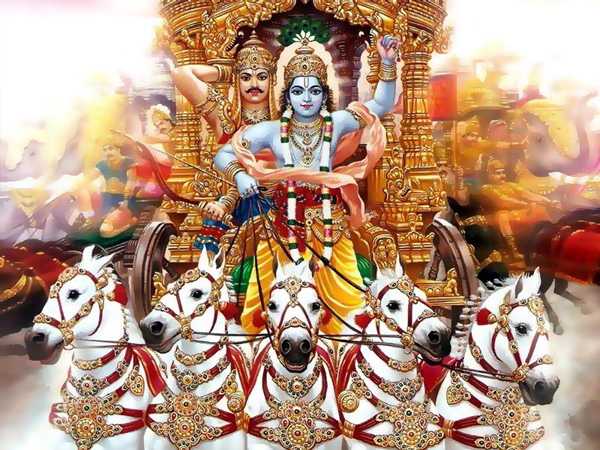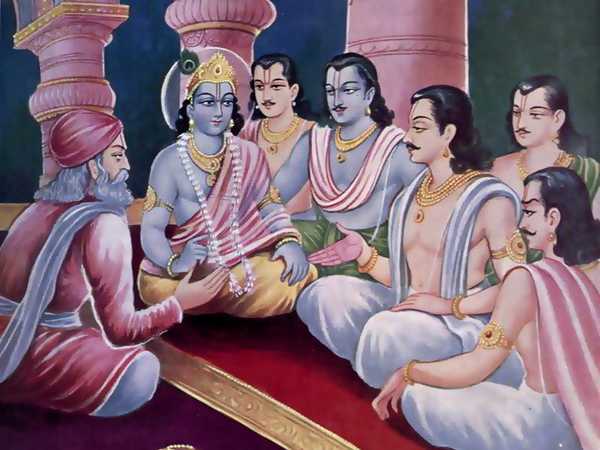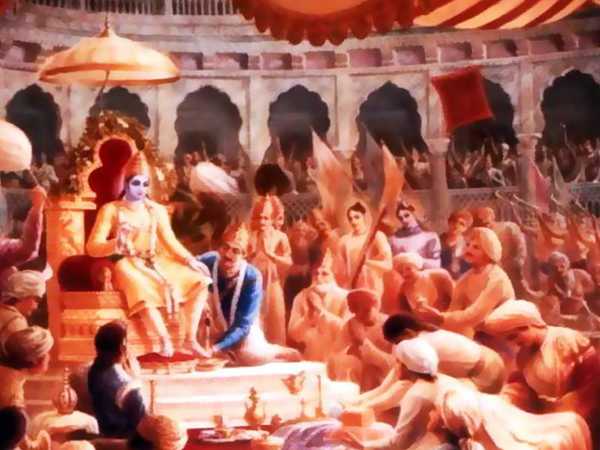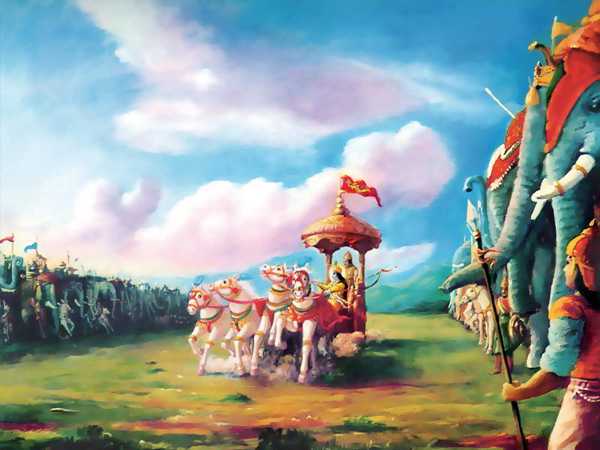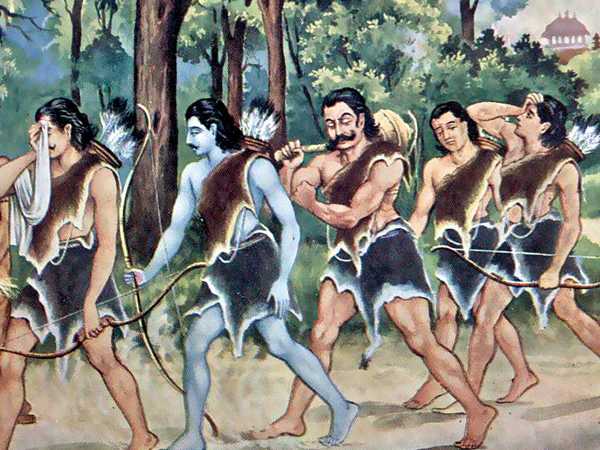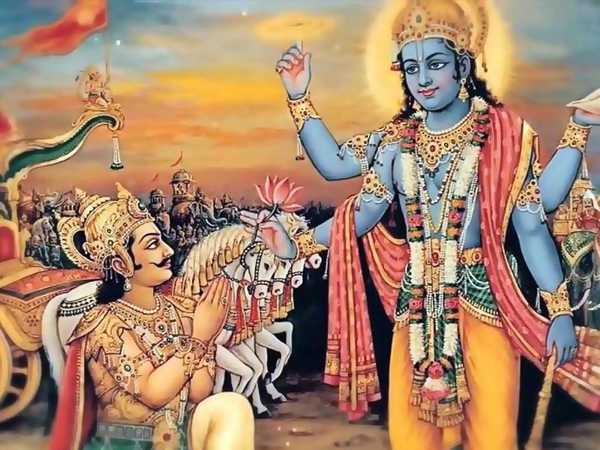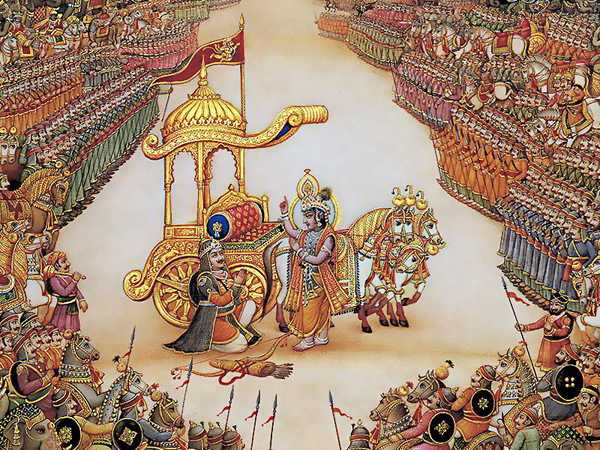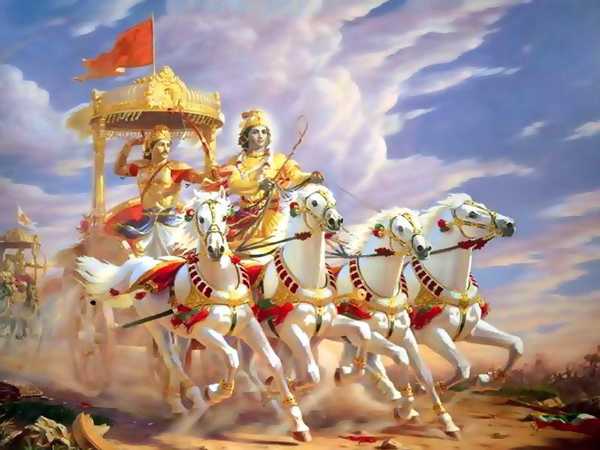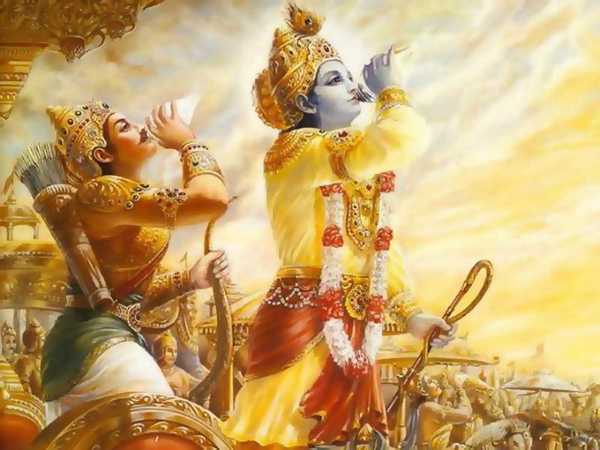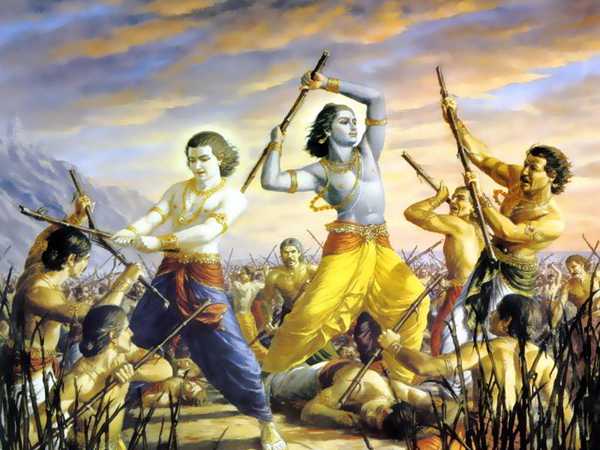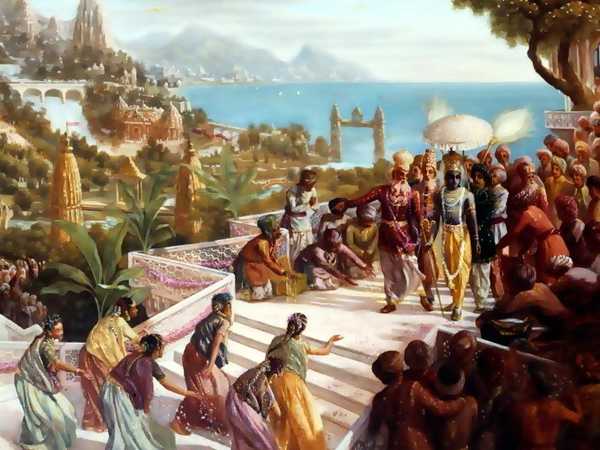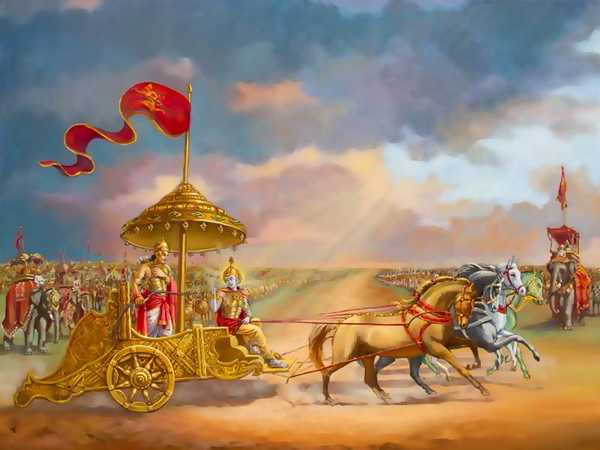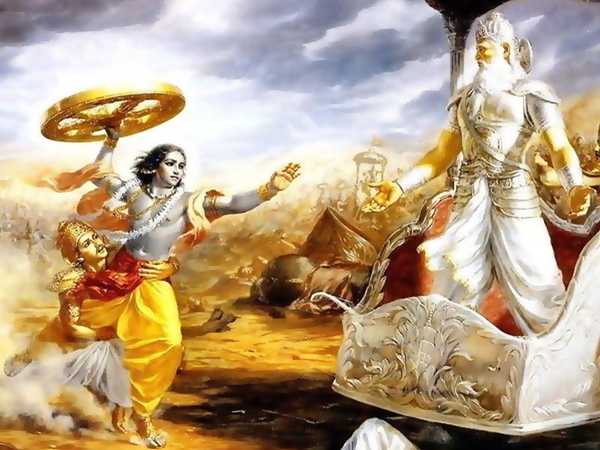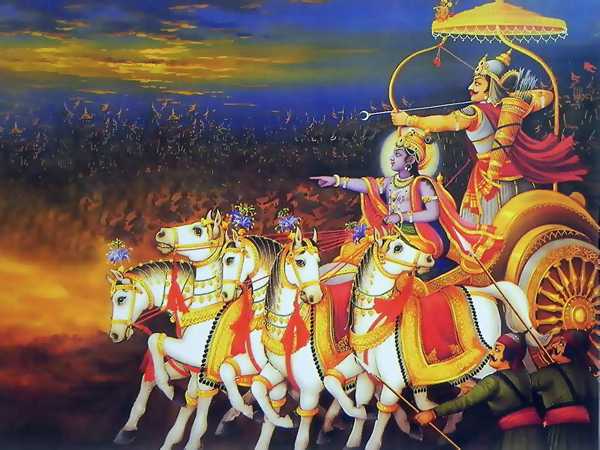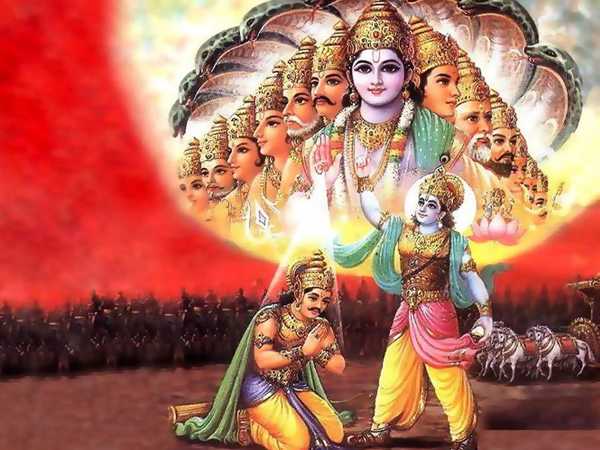Chapter 1
OM! HAVING BOWED down unto Narayan, and unto that most exalted of malebeings, viz., Nara, and unto the goddess Saraswati also, must the wordJaya be uttered.
Chapter 1
Om! Having bowed down unto Narayana, and unto that most exalted of malebeings, Nara, and unto the goddess Sarasvati also, must the word Jaya beuttered.
Chapter 1
OM! AFTER HAVING bowed down to Narayana, and Nara, the foremost of men,and unto the goddess Saraswati also, must the word Jaya be uttered.
Chapter 1
OM! HAVING BOWED down to Narayana, and Nara the most exalted of malebeings, and also to the goddess Saraswati, must the word Jaya be uttered.
Chapter 1
Om! Having bowed down unto Narayana, and to Nara, the foremost of men, asalso to the goddess Sarasvati, should the word “Jaya” be uttered.
Chapter 1
OM! HAVING BOWED down to Narayana, and Nara, the most exalted of malebeings, and also to the goddess Saraswati, must the word ‘Jaya’ beuttered.
Chapter 1
Om! Having bowed down unto Narayana, and Nara the most exalted of malebeings, and unto the goddess Sarasvati, must the word Jaya be uttered!
Chapter 1
Om! Having bowed down into Narayana, and to Nara, the foremost of men, asalso to the goddess Sarasvati, should the word “Jaya” be uttered.
Chapter 1
Om! After having bowed down to Narayana, and Nara, the most exalted malebeing, and also to the goddess Saraswati, must the word Jaya be uttered.
Chapter 1
Om! Having bowed down to Narayana, and Nara the foremost of male beings,and the goddess Saraswati also, must the word Jaya be uttered.
Chapter 1
Om! Having bowed down unto Narayana, and to Nara, the foremost of men, asalso to the goddess Sarasvati, should the word “Jaya” be uttered.
Chapter 1
Om! Having bowed down unto Narayana and Nara, the foremost of malebeings, and unto the goddess Sarasvati, must the word Jaya be uttered.
Chapter 1
OM! Having bowed down to Narayana, and Nara, the most exalted of malebeings, and also to the goddess Saraswati, must the word Jaya be uttered.
Chapter 1
Chapter 1
Om! Having bowed down unto Narayana and Nara, the most exalted of malebeings, and the goddess Sarasvati, must the word Jaya be uttered.
Chapter 1
OM! HAVING BOWED down to Narayana, and Nara, the foremost of male beings,and unto the goddess Saraswati, must the word Jaya be uttered.
Chapter 1
OM! HAVING BOWED down unto Narayana, and Nara the foremost of malebeings, and unto the goddess Saraswati, must the word Jaya be uttered.
Chapter 1
OM! HAVING BOWED down unto Narayana, and Nara the foremost of malebeings, and unto the goddess Saraswati, must the word Jaya be uttered.
Chapter 10
“Sanjaya said, ‘After the fall of the mighty bowman Drona on that day, OBharata, and after the purpose had been baffled of that mightycar-warriors, viz., the son of Drona, and after the vasty army,
Chapter 10
“Vaisampayana said, ‘Thus addressed, O thou of Kuru’s race, by the oldking, the citizens and the inhabitants of the provinces stood sometimelike men deprived of consciousness.
Chapter 10
“Indra said, This whole indestructible universe, O gods, hath beenpervaded by Vritra. There is nothing that can be equal to the task ofopposing him. I was capable of yore, but now I am incapable.
Chapter 10
“Dhritarashtra said,–‘Tell me, O Sanjaya, of the period of life, thestrength, the good and bad things, the future, past and present, of theresidents, O Suta, of this Varsha of Bharata, and of the Himavat-varsha,as also of Hari-varsha, in detail.”
Chapter 10
“Narada said,–‘Possessed of great splendour, the assembly house ofVaisravana, O king, is a hundred yojanas in length and seventy yojanas inbreadth. It was built, O king, by Vaisravana himself using his asceticpower.
Chapter 10
Vaishampayana said, “After that night had gone away, the driver ofDhrishtadyumna’s car gave intelligence to king Yudhishthira of the greatslaughter that had been caused during the hour of sleep.
Chapter 10
“Dhritarashtra said, ‘O Muni of profound wisdom, it is even as thousayest! I know it well as do all these kings! Indeed, what thouconsiderest to be beneficial for the Kurus was pointed out to me, O Muni,by Vidura and Bhishma and Drona. And, if I deserve thy favour, and ifthou hast kindness for the Kurus, do thou exhort my wicked sonDuryodhana!’
Chapter 10
“Vaisampayana said, ‘Then clad in a cowherd’s dress, and speaking thedialect of cowherds, Sahadeva came to the cowpen of Virata’s city.
Chapter 10
Vaishampayana said, “Hearing these words of Vidura, that bull of Bharatasrace (Dhritarashtra) ordered his car to be yoked.
Chapter 10
Sauti said, ‘And Ruru, on hearing those words, replied, ‘My wife, dear tome as life, was bit by a snake; upon which, I took, O snake, a dreadfulvow, viz., that I would kill every snake that I might come across.Therefore shall I smite thee and thou shalt be deprived of life.’
Chapter 10
Bhimasena said, “Thy understanding, O king, has become blind to thetruth, like that of a foolish and unintelligent reciter of the Veda inconsequence of his repeated recitation of those scriptures.
Chapter 10
“Indra said, “Even so it is; the might of Brahmanas is great and thereare none more powerful than Brahmanas, but I can never bear withequanimity the insolent pride of Avikshita’s son, and so shall I smitehim with my thunderbolt.
Chapter 10
“Sanjaya said, ‘Beholding the army broken, the valiant king of theMadras, addressed his driver, saying, “Quickly urge these steeds enduedwith the fleetness of thought.
Chapter 10
“Yudhisthira said, ‘I wish to know, O royal sage, whether any fault isincurred by one who from interested or disinterested friendship impartsinstructions unto a person belonging to a low order of birth! Ograndsire, I desire to hear this, expounded to me in detail.
Chapter 10
“Vaisampayana said, ‘Having addressed the Suta’s son in this way,Dhritarashtra, afflicted with excessive grief of heart and hopeless ofhis son’s victory, fell down on the ground.
Chapter 100
“Sanjaya said, ‘Saying these words, king Duryodhana pierced Arjuna withthree shafts of great impetuosity and capable of penetrating into thevery vitals.
Chapter 100
“Yudhishthira said, ‘O best of regenerate ones, I desire again to hear ofthe achievements in detail of Agastya–that illustrious Rishi endued withgreat intelligence.'”
Chapter 100
“Narada continued, ‘Here is that spacious and celebrated city of cities,called Hiranyapura, belonging to the Daityas and Danavas, possessing ahundred diverse kinds of illusion.
Chapter 100
Sanjaya said, “Then Bhishma, the son of Santanu, went out with thetroops. And he disposed his own troops in mighty array calledSarvatobhadra.
Chapter 100
“Yudhishthira said, ‘How was Nahusha plunged into distress? How was hehurled down on the earth? How, indeed, was he deprived of the sovereigntyof the gods? It behoveth thee to recite everything to me.’
Chapter 100
“Vaisampayana said, ‘The monarch Santanu, the most adored of the gods androyal sages, was known in all the worlds for his wisdom, virtues, andtruthfulness (of speech).
Chapter 100
“Yudhishthira said, ‘Tell me, O grandsire, how kings desirous of victoryshould, O bull of Bharata’s race, lead their troops to battle even byoffending slightly against the rules of righteousness!’
Chapter 101
“Sanjaya said, ‘Thy warriors, as soon as they beheld those foremost ofpersons of the Vrishni-Andhaka and the Kuru races, lost no time, eachstriving to be first, in proceeding against them from a desire ofslaughtering them.
Chapter 101
“Lomasa said, ‘Armed with the Vajra then, and supported by celestialsendued with great might, Indra then approached Vritra, who was thenoccupying the entire earth and the heaven.
Chapter 101
“Narada said, ‘This region belongeth to the birds, all of whom possessexcellent feathers. They all subsist on snakes. They never feel anyfatigue in putting forth their prowess, or in making journeys, or inbearing burthens.
Chapter 101
Sanjaya said, “Then the noble Abhimanyu of great energy, borne by hissteeds of a tawny hue, rushed at the mighty host of Duryodhana,scattering his arrowy showers like the clouds pouring torrents of rain.
Chapter 101
“Yudhishthira said, ‘Where do those foolish, wretched, and sinful men go,O chief of men, that steal or misappropriate such articles as belong toBrahmanas?’
Chapter 101
“Vaisampayana said, ‘O monarch, after the nuptials were over, kingSantanu established his beautiful bride in his household. Soon after wasborn of Satyavati an intelligent and heroic son of Santanu namedChitrangada. He was endued with great energy and became an eminent man.
Chapter 101
“Yudhishthira said, ‘Of what disposition, of what behaviour, of whatform, how acoutred, and how armed should the combatants be in order thatthey may be competent for battle?’
Chapter 102
"Dhritarashtra, said, 'Describe to me, O Sanjaya, the diverse kinds ofstandards resplendent with great beauty, of both the Partha and ourwarriors (in that battle).' "Sanjaya said, 'Hear, O king, of the diverse kinds of standards of thosehigh-souled warriors. Listen to me as I describe their forms and names.Indeed, O king, upon the cars of those foremost of car-warriors were seendiverse kinds of standards that shone like blazing flames of fire. Madeof gold, or decked with gold,
Chapter 102
“Lomasa said, ‘The Kalakeyas then having recourse to that receptacle ofwaters, which is the abode of Varuna, began their operations for thedestruction of the universe.
Chapter 102
“Narada said, ‘The region where we now are is called Rasatala and is theseventh stratum below the Earth. Here dwelleth Surabhi, the mother of allkine, she, who was born of the Amrita.
Chapter 102
Dhritarashtra said, “How, O Sanjaya, did Alamvusha resist in combat theheroic son of Arjuna smiting many of our mighty car-warriors in battle?
Chapter 102
“Yudhishthira said, ‘O grandsire, it has been said that all pious menattain to the same region after death. Is it true, O Bharata, that thereis difference of position or status among them?’
Chapter 102
“Vaisampayana said, ‘O thou of Kuru’s race, after Chitrangada was slain,his successor Vichitravirya being a minor, Bhishma ruled the kingdom,placing himself under the command of Satyavati. When he saw that hisbrother, who was the foremost of intelligent men, attained to majority, Bhishma set his heart upon marrying Vichitravirya.
Chapter 102
“Yudhishthira said. ‘What are the well-known indications, O bull ofBharata’s race, of the (future) success of an army? I desire to knowthem.’
Chapter 103
“Dhritarashtra said, ‘After Arjuna had got the ruler of the Sindhuswithin sight, what, O Sanjaya, did the Panchalas, attacked byBharadwaja’s son, do, encountering the Kurus?’
Chapter 103
“The celestials said, ‘Through thy favour it is that all born beings ofthe four kinds increase. And they being created, propitiate the dwellersof heaven by offerings made to the gods and the names of departedforefathers.
Chapter 103
“Narada said, ‘This foremost of cities that thou beholdest and whichresembles the Amaravati of the chief of the celestials himself, is knownby the name of Bhogavati.
Chapter 103
Dhritarashtra said, “How did those bulls among men, viz., that greatbowman Drona, and Dhananjaya the son of Pandu, encounter each other inbattle?
Chapter 103
“Yudhishthira said, ‘Thou hast discoursed to us on diverse kinds of gift,on tranquillity of soul, on Truth, on compassion, on contentment withone’s wedded wife, and the merits of gift.
Chapter 103
“Vaisampayana said, ‘The unfortunate Satyavati then became plunged ingrief on account of her son. And after performing with herdaughters-in-law the funeral rites of the deceased, consoled, as best shecould, her weeping daughters-in-law and Bhishma, that foremost of allwielders of weapons.
Chapter 103
“Yudhishthira said, ‘Tell me, O grandsire, how a kin should behavetowards foe that is mild, towards one that is fierce, and towards onethat has many allies and a large force.’
Chapter 104
“Sanjaya said, ‘Kshemadhurti, O monarch, pierced the advancingVrihatkshatra of great valour, that prince of the Kaikeyas, with manyarrows in the chest.
Chapter 104
“Yudhishthira said, ‘O great saint! I am desirous of hearing in detailwhy it was that Vindhya, made senseless with wrath, suddenly began toincrease his bulk.'”
Chapter 104
“Narada then said, ‘This one is the charioteer of the name of Matali. Heis besides a dear friend of Sakra. Pure in conduct, he hath an excellentdisposition and possesses numerous virtues.
Chapter 104
Sanjaya said, “At mid-day, O king, happened a fierce battle, fraught withgreat carnage, between Bhishma and the Somakas.
Chapter 104
“Yudhishthira said, ‘Man, it is said, is endued with a period of lifeextending for a hundred years, and with energy and might that areconsiderable.
Chapter 104
“Bhishma continued, ‘In olden days, Rama, the son of Jamadagni, in angerat the death of his father, slew with his battle axe the king of theHaihayas. And Rama, by cutting off the thousand arms of Arjuna (theHaihaya king), achieved a most difficult feat in the world.
Chapter 104
“Yudhishthira said, ‘How should a righteous king, who is opposed by hisown officers, whose treasury and army are no longer under his control,and who has no wealth, conduct himself for acquiring happiness?’
Chapter 105
“Sanjaya said, ‘The illustrious son of Somadatta pierced each of the sonsof Draupadi, those great bowmen, with five arrows, and once more withseven arrows.
Chapter 105
“Lomasa said, ‘That blessed saint, the son of Varuna, having reached thesea spake unto the assembled gods, and the saints gathered together,saying ‘I surely am going to drink up the ocean–that abode of the god ofwaters.
Chapter 105
“Kanwa said, ‘Meanwhile, O Bharata, the mighty Garuda heard what hadhappened, viz., the bestowal by Sakra of length of days on the NagaSumukha.
Chapter 105
Sanjaya said, “O tiger among men, Arjuna sent those Kshatriyas thatfollowed Susarman to the abode of the King of the Dead by means of hiswhetted shafts.
Chapter 105
“Yudhishthira said, ‘Tell me, O chief of Bharata’s race, how the eldestbrother should behave towards his younger brothers and how the youngerbrothers should behave towards their eldest brother.’
Chapter 105
“Bhishma, continued, ‘Listen, O mother, to me as I indicate the means bywhich the Bharata line may be perpetuated. Let an accomplished Brahmanabe invited by an offer of wealth, and let him raise offspring upon thewives of Vichitravirya.’
Chapter 105
“The sage said, ‘If, on the other hand, O Kshatriya, thou thinkest thatthou hast any prowess still, I shall discourse to thee about that line ofpolicy which thou mayst adopt for recovering thy kingdom.
Chapter 106
“Sanjaya said, ‘Having fled away from Bhima, Alamvusha, in another partof the field, careered fearlessly in battle.
Chapter 106
“Lomasa said, ‘Then gathered together, Brahma, the grandfather of men(thus) addressed, ‘Go ye, O gods! whither your pleasure may lead you, oryour desire conduct you.
Chapter 106
“Janamejaya said, ‘Interminably wedded to evil, blinded by avarice,addicted to wicked courses, resolved upon bringing destruction on hishead,
Chapter 106
“Sanjaya said, ‘Beholding Bhishma excited with wrath in battle,surrounded on all sides by the Pandavas like the Sun in the firmament.
Chapter 106
“Yudhishthira said, ‘The disposition is seen, O grandsire, in all theorders of men, including the very Mlechchhas, of observing fasts.
Chapter 106
“Vaisampayana said, ‘Soon after the monthly season of the princess ofKosala had been over, Satyavati, purifying her daughter-in-law with abath, led her into the sleeping apartment. There seating her upon aluxurious bed, she addressed her, saying, ‘O Princess of Kosala, thyhusband hath an elder brother who shall this day enter thy womb as thychild.
Chapter 106
“The king said, ‘I do not desire, O Brahmana, to support life by deceitor fraud. I do not desire wealth, however great, which is to be earned byunrighteous means.
Chapter 107
“Dhritarashtra said, ‘Tell me, O Sanjaya, how Yuyudhana rushed againstthe son of Bharadwaja in battle. I feel a great curiosity to hear it.’
Chapter 107
“Lomasa said, ‘O most righteous of kings! When he heard these words(proceeding) from the sky, he had faith therein, and did all that he wasdirected to do, O chief of the men of Bharata’s race!
Chapter 107
“Narada said, ‘Thus addressed by Viswamitra of great intelligence Galavawas filled with such anxiety that he could not sit or lie down, or takehis food.
Chapter 107
Sanjaya said, “Then thy sire, excited with wrath, began to strike theParthas and their troops all round, with excellent shafts of greatsharpness. And he pierced Bhima with twelve shafts, and Satyaki withnine.
Chapter 107
“Yudhishthira said, ‘O high-souled grandsire, thou hast duly discoursedto us on the subject of Sacrifices, including the merits in detail thatattach to them both here and hereafter.
Chapter 107
“Janamejaya said, ‘What did the god of justice do for which he wascursed? And who was the Brahmana ascetic from whose curse the god had tobe born in the Sudra caste?’
Chapter 107
“Yudhishthira said, ‘Thou hast, O scorcher of foes, described the courseof duties, the general conduct, the means of livelihood, with theirresults, of Brahmanas and Kshatriyas and Vaisyas and Sudras.
Chapter 108
“Sanjaya said, ‘That bull amongst the Sinis, viz., Satyaki, hearing thesewords o, full affection, agreeable, fraught with sweet sounds, opportune,delightful, and equitable that were uttered by king Yudhishthira thejust, replied unto him,
Chapter 108
“Lomasa said, ‘That same king, of a powerful bow, standing at the head ofthe surrounding, (i.e., the occupant of an imperial throne) of a powerfulcar, (i.e., possessing every great fighting power) became the delight ofthe eyes and the soul of all the world.
Chapter 108
“Garuda said, ‘O Galava, commanded I have been by God, who is the causeof all knowledge. I ask thee, towards which quarter shall I first takethee to see what lie there?
Chapter 108
Sanjaya said, “While they were battling, the Sun set, O Bharata, aidthere came the dreadful hour of twilight and the battle could no longerbe seen.
Chapter 108
“Yudhishthira said, ‘Do thou tell me, O grandsire, of that which isregarded as the foremost of all Tirthas. Indeed, it behoveth thee toexpound to me what that Tirtha is which conduces to the greatestpurity.'[501]
Chapter 108
“Vaisampayana said, ‘Thus asked, the tiger among Munis then answeredthose Rishis of ascetic wealth, ‘Whom shall I blame for this?
Chapter 108
“Yudhishthira said, ‘The path of duty is long. It has also, O Bharata,many branches. What, however, according to thee, are those duties thatmost deserve to be practised? What acts, according to thee, are the mostimportant among all duties, by the practice of which I may earn thehighest merit both here and hereafter?’
Chapter 109
“Lomasa said, ‘The blessed God having heard what Bhagiratha had said, andwith a view to doing what was agreeable to the residents of heaven,replied to the king, saying, ‘So let it be.
Chapter 109
“Garuda continued, ‘In days of yore, Vivaswat, having performed asacrifice, gave this quarter away as a present (Dakshina) unto hispreceptor, And it is for this that this region is known by the name ofDakshina (south).
Chapter 109
Dhritarashtra said, “How did Sikhandin advance against the son of Gangain battle, and how did Bhishma also advance against the Pandavas? Say allthis unto me, O Sanjaya!”
Chapter 109
“Yudhishthira said, ‘It behoveth thee, O grandsire, to tell me what arethe highest, the most beneficial, and the most certain fruit of all hindsof fasts k this world.’


